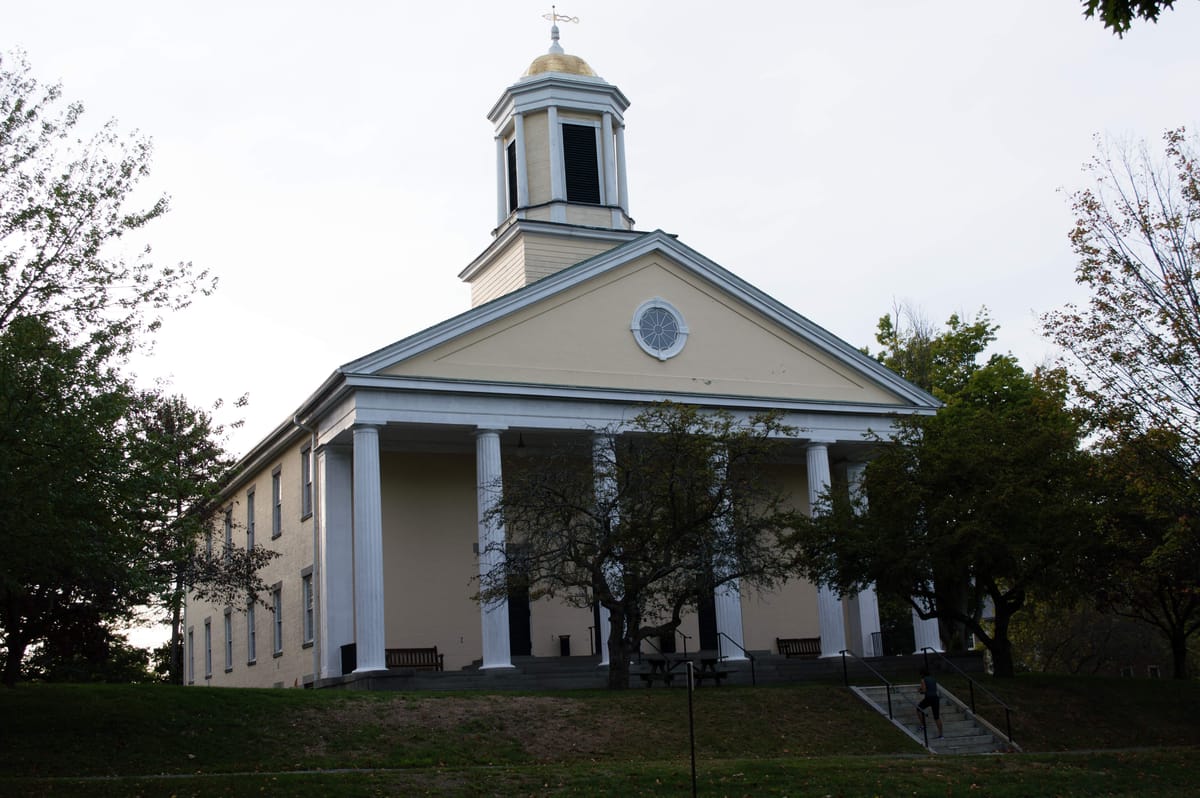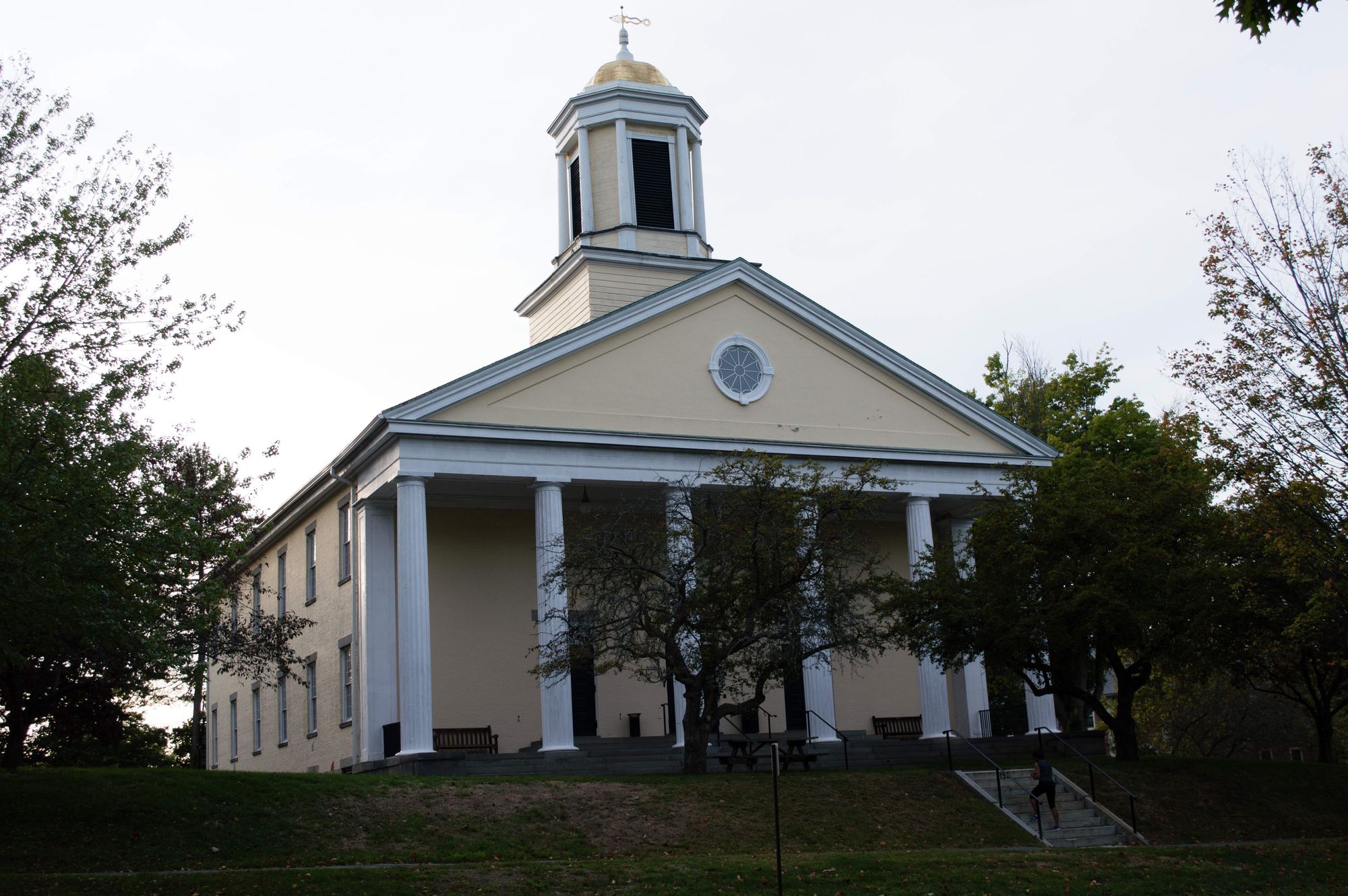A Better Amherst: Amherst Isn't Doing Its Job
Charles Sutherby ’23E and Mason Quintero ’23 discuss the tiny percentage of Amherst graduates pursuing public service in the first of a three-part series.


This op-ed is the first part of a three-week series entitled “A Better Amherst.” In this series, we examine the inadequacy of Amherst’s support for students interested in impactful work and careers, and we propose a set of solutions that would make Amherst better for both its students and the world.
Terras Irradient: “Let them give light to the world.”
The mission statement of Amherst College carries a promise. A promise that Amherst will produce future leaders who strive to solve society’s most pressing problems — that Amherst will empower its graduates to be agents of positive change. Anthony Marx, Amherst’s last president, said it best when he declared: “We’re in the business of graduating people who will make the world better in some way.” We live in a moment of unprecedented global crises — public health crises, climate crises, and democratic crises, to name just a few. At this moment, the world’s need for changemakers has never been so urgent, and so the stakes of Amherst’s promise have never been higher.
Unfortunately, reality contradicts Amherst’s promise. In 2020, only 9 percent of Amherst’s graduating class took jobs in the government and nonprofit sectors. Meanwhile, in the same year, 43 percent took jobs in the high-wealth sectors of finance, consulting, and tech. These statistics are consistent across the last several years: fewer than one in 10 of us (and in some years, barely one in 20) will find work at governments or nonprofits. Yet, nearly half of us will find ourselves working at the likes of J.P. Morgan, McKinsey, and Apple — organizations driven by profit, not impact. Answering to shareholders, not to a greater good. These are not the organizations solving society’s most pressing issues.
As it turns out, Amherst College is one of the worst elite liberal arts colleges in the country at producing graduates who pursue careers in public service. In 2013, the Aspen Institute launched a college rankings initiative that ranked the U.S.’s top 20 liberal arts colleges based on the percentage of graduates that enter public service. Their findings? Amherst was 17th out of 20. When we look at the numbers, one conclusion becomes undeniable: Amherst is uniquely bad at producing the changemaking alumni that it promises.
In order to understand Amherst’s pitiful public service record, we first have to answer a crucial underlying question: Why do so many of us pursue high-wealth jobs rather than working to make a difference in the world? Dr. Amy Binder, a sociologist at the University of California San Diego, gives us an answer: “Current students are gravitating to Wall Street and consulting firms less by choice than because of the skewed recruiting system the schools themselves helped to create.”
Dr. Binder’s research describes the precarious position that students at elite colleges are in: we’re highly status-conscious and competitive, yet deeply uncertain about our career paths. We have lifelong track records of excelling in highly-structured competitions for prestige — AP classes, varsity soccer teams, Model UN, college applications — in which the next rungs of the ladder are always obvious and stable. But the prospect of choosing a career is the opposite: unstructured, unclear, and unstable. It’s not just overwhelming — it’s downright terrifying.
High-wealth firms take advantage of our uncertain position: they use massive recruiting budgets to monopolize our attention, and they advertise professional development and exit opportunities to alleviate our fears of the future. Other employers — particularly those in the public and social sectors — simply do not have the resources to compete. The result? Amherst students are diverted away from impactful career paths and toward high-wealth, low-impact jobs. The lesson here is that when elite colleges don’t take deliberate steps to develop alternative career pathways, students default to what’s most visible. And at Amherst, that’s finance, consulting, and tech.
Amherst lacks pathways into impactful careers, and this is a problem. More than that, it’s a glaring institutional failure. By starving students of exposure to impactful work and of visibility into impactful careers, Amherst is preventing its students from being the changemakers they intend to be. At an unprecedented historical moment in which the world is overwhelmed by crisis, giving students pathways into solving pressing global issues should be among Amherst’s top priorities.
Yet instead of connecting us to organizations that are striving to solve societal issues like climate change and inequality, we’re steered towards industries which Amherst’s own courses tell us are partly to blame for those very issues. And while some students pursue high-wealth jobs for perfectly justifiable reasons — paying off student debt, securing a U.S. work visa, or actually finding the work enjoyable or meaningful — they’re not the majority. Dr. Binder’s research shows that far too many students enter these careers “even as they rationalize that they are on their way to some more noble end.” Yet, research by the Oxford-affiliated group 80,000 Hours has found no evidence that high-wealth careers hold any advantage as launching pads into impactful work (besides paycheck). At best, these jobs delay graduates from doing the work that’s most meaningful, satisfying, and impactful. At worst, they prevent it completely — drawing students into industries, like finance, that made headlines last year for their abusive working conditions. Thus, without a dramatic shift in Amherst’s efforts to create student pathways into impactful work, the College will continue to profoundly disservice both students and society.
Amherst College promises that its graduates will go on to make a difference in their communities and in the world. This is a fantastic promise; and with the world-class education Amherst provides, this school has the potential to generate immense positive change. But right now, Amherst does a profoundly inadequate job of connecting students to impactful work. As a result, Amherst betrays its promise. With this betrayal, we stifle the potential of every Amherst student on this campus; we deprive our world of the kinds of leaders it so desperately needs; and we violate the promise that justifies this institution’s very existence. Our students, our alumni, and our world deserve better. We need to change — and, given the urgency of our world’s crises, we need to do so right away.
Thankfully, we can change. Over the next two weeks, we will explain how — and we hope you’ll stay tuned.
Correction, Sept. 15, 2022: A previous version of this article stated that Swarthmore College’s Class of 2020 has twice the percentage of alumni in public service as Amherst’s. However, this may not be accurate due to differences in the ways the institutions collect and publish data.



Comments ()